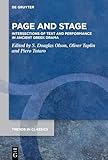Page and Stage : Intersections of Text and Performance in Ancient Greek Drama / ed. by Stuart Douglas Olson, Oliver Taplin, Piero Totaro.
Material type: TextSeries: Trends in Classics - Supplementary Volumes ; 146Publisher: Berlin ; Boston : De Gruyter, [2023]Copyright date: ©2023Description: 1 online resource (IX, 184 p.)Content type:
TextSeries: Trends in Classics - Supplementary Volumes ; 146Publisher: Berlin ; Boston : De Gruyter, [2023]Copyright date: ©2023Description: 1 online resource (IX, 184 p.)Content type: - 9783111247397
- 9783111248615
- 9783111248028
- 882.0109 23/eng/20231120
- online - DeGruyter
- Issued also in print.
| Item type | Current library | Call number | URL | Status | Notes | Barcode | |
|---|---|---|---|---|---|---|---|
 eBook
eBook
|
Biblioteca "Angelicum" Pont. Univ. S.Tommaso d'Aquino Nuvola online | online - DeGruyter (Browse shelf(Opens below)) | Online access | Not for loan (Accesso limitato) | Accesso per gli utenti autorizzati / Access for authorized users | (dgr)9783111248028 |
Frontmatter -- Acknowledgements -- Contents -- List of Figures -- Introduction to Page and Stage -- Dramatic Space and Theatrical Meaning: The Case of Sophocles’ Antigone -- The Inference of Staging from Deictics, with some Pointers towards Sophocles’ Trachiniae -- Divinity on the Classical Greek Stage: Proposing a New Model -- Victory Ritual and the Performance of Victory in Aristophanes’ Exodoi -- Some Staging Issues and Their Consequences in Aristophanes’ Clouds -- Sexy Mutes on the Aristophanic Stage -- Pseudartabas and the Persian Eunuchs in Aristophanes’ Acharnians: Textual and Staging Problems -- Poetics of Props: On Aristophanes, Acharnians 393–489 -- Comic Fragments and Lost Dramatic Scenes: Some Considerations -- Dramaturgical Memory and Virtual Theatre in the Scholia to Aristophanes’ Frogs -- No, They Didn’t Write Stage Instructions, but… -- List of Contributors -- Index Locorum -- Index Rerum
restricted access online access with authorization star
http://purl.org/coar/access_right/c_16ec
Our knowledge of the ancient theatre is limited by the textual and iconographic character of the evidence available to us: we cannot watch or otherwise experience an Athenian tragedy or comedy. These essays, by a distinguished group of international scholars, bridge the gap between the surviving literary and iconographic evidence and the realities of performance on the ancient Greek stage. This ambitious goal is reached by means of a detailed examination of several case-studies: the construction of dramatic space in Sophocles’ Antigone; the significance of the use of deictic pronouns in Sophocles’ Trachiniae; the theatrical and religious dynamics of the appearance of divine figures on stage; the relationship between the victory celebrations at the end of Aristophanic comedies and their counterparts in the after-performance real world; the investigation of nude or semi-nude female characters in Aristophanes; the staging of Clouds and the opening scene of Acharnians; the meditation on the metapoetics of the use of props in 5th-century comedy; the relationship between performance context and text through a close reading of a number of Aristophanic fragments; the way the scholia vetera on Frogs imagine and use questions of staging practice; and the potential Aeschylean authorship of some of stage-direction traceable in Aeschylus’ Eumenides and Diktoulkoi.
Issued also in print.
Mode of access: Internet via World Wide Web.
In English.
Description based on online resource; title from PDF title page (publisher's Web site, viewed 06. Mrz 2024)


